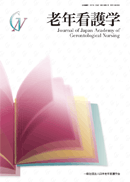Volume 23, Issue 2
Displaying 1-13 of 13 articles from this issue
- |<
- <
- 1
- >
- >|
Foreword
-
2019Volume 23Issue 2 Pages 3-4
Published: 2019
Released on J-STAGE: February 01, 2020
Download PDF (915K)
Special Issue 1: The 23rd Annual Scientific Meeting of Japan Academy of Gerontological Nursing Presidential Address
-
2019Volume 23Issue 2 Pages 5-11
Published: 2019
Released on J-STAGE: February 01, 2020
Download PDF (1381K) -
2019Volume 23Issue 2 Pages 12-21
Published: 2019
Released on J-STAGE: February 01, 2020
Download PDF (2900K) -
2019Volume 23Issue 2 Pages 22-27
Published: 2019
Released on J-STAGE: February 01, 2020
Download PDF (1864K) -
2019Volume 23Issue 2 Pages 28-33
Published: 2019
Released on J-STAGE: February 01, 2020
Download PDF (1088K) -
2019Volume 23Issue 2 Pages 34-37
Published: 2019
Released on J-STAGE: February 01, 2020
Download PDF (1017K)
Special Issue 2: Topics in Dementia Care
-
2019Volume 23Issue 2 Pages 38-43
Published: 2019
Released on J-STAGE: February 01, 2020
Download PDF (1102K) -
2019Volume 23Issue 2 Pages 44-48
Published: 2019
Released on J-STAGE: February 01, 2020
Download PDF (1027K)
Original Article
-
2019Volume 23Issue 2 Pages 49-58
Published: 2019
Released on J-STAGE: February 01, 2020
Download PDF (963K)
Brief Reports
-
2019Volume 23Issue 2 Pages 59-67
Published: 2019
Released on J-STAGE: February 01, 2020
Download PDF (908K) -
2019Volume 23Issue 2 Pages 68-74
Published: 2019
Released on J-STAGE: February 01, 2020
Download PDF (895K) -
2019Volume 23Issue 2 Pages 75-83
Published: 2019
Released on J-STAGE: February 01, 2020
Download PDF (896K)
Committee Activities Report
-
2019Volume 23Issue 2 Pages 84-87
Published: 2019
Released on J-STAGE: February 01, 2020
Download PDF (1000K)
- |<
- <
- 1
- >
- >|
